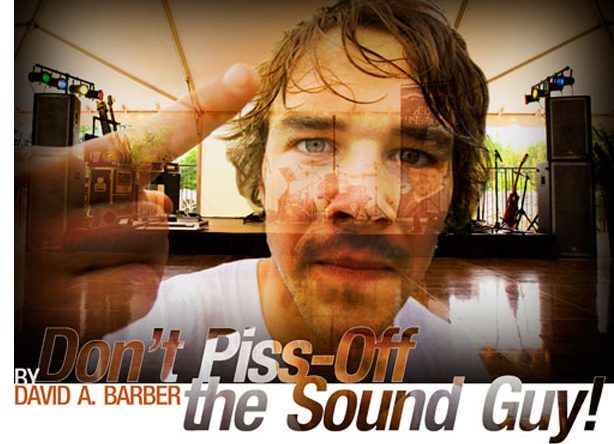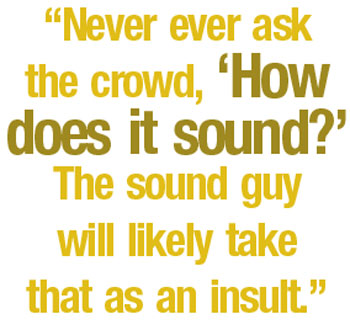 There is a reason why the most successful touring acts bring their own sound engineer with them. You never know what you’re going to get. Sound guys (and sometimes gals) run the gamut from terrifically helpful, to prima-donna assholes. If you’re touring around at the bar or club level, you’re going be at the mercy of whoever happens to be working sound board that night. Many of these people have college degrees in sound engineering, many more are former musicians themselves and they all have different personalities. If you’re lucky, you’ll get a pro who takes pride in his work. If you’re not lucky, you may get a tone-deaf overworked hack who’s nursing a wicked hangover from the night before––or worse, he may be killing that hangover by getting drunk early. Either way, you want to follow a few simple rules.
There is a reason why the most successful touring acts bring their own sound engineer with them. You never know what you’re going to get. Sound guys (and sometimes gals) run the gamut from terrifically helpful, to prima-donna assholes. If you’re touring around at the bar or club level, you’re going be at the mercy of whoever happens to be working sound board that night. Many of these people have college degrees in sound engineering, many more are former musicians themselves and they all have different personalities. If you’re lucky, you’ll get a pro who takes pride in his work. If you’re not lucky, you may get a tone-deaf overworked hack who’s nursing a wicked hangover from the night before––or worse, he may be killing that hangover by getting drunk early. Either way, you want to follow a few simple rules.
• Always be nice to the sound engineer (even if he’s an ass to you). Treat him like a highly skilled professional (even if he doesn’t act like one). Do not treat him like a DJ who’s never run sound before and is in way over his head (even if he is).
• Keep in mind that every room is different and the sound guy probably knows better than you what sounds right in his room. No, it won’t sound the same as it does in your rehearsal space––it’s not supposed to. It’s supposed to sound better than that for the audience, who are listening through speakers that are different from the ones that you are.
• Do what the sound guy tells you to do. He’s trying really hard to make you sound great, but if your volumes are wrong on the stage, there’s only so much he can do. If he asks you to turn your amp down, do it! Then, if you can’t hear your instrument, ask for him to turn it up in your monitor. This goes double during sound check (if you’re lucky enough to get one).
• Never ever ask the crowd, “How does it sound?” The sound guy will likely take that as an insult. The same is true for going out on the dance floor or seating area to listen. You are responsible for what comes out of your instrument, let the sound guy worry about the rest of the room. Never tell him that it doesn’t sound right in the room, unless it’s a very serious problem. Overly sensitive sound guys will take this as an insult. Chances are, the audience will let him know if it’s really bad and obviously his fault.
• Get your gear off/on the stage quickly. This is most important if there are bands scheduled to play after you. There’s only so much time allowed to get you off stage and the next band on. If you’re really quick about it, they may actually ask you to play a little longer to fill in the time. That’s the best way to be. If you’re the headliner, there’s still a sound guy who has to pack up his equipment and clean off the stage before he can go home. Be nice to him.
• Don’t leave the stage messy. Don’t leave a bunch of empty beer bottles, cigarette butts and snack wrappers all over the place. If you bring it on the stage, take it off with you. That includes the set lists you taped to the monitor or mic stand, too.
• Don’t be afraid to ask for more of something in the monitor. This is especially true during sound check (if you get one), but is also okay to ask for between songs. You need to hear yourself and your bandmates in order to make sure you’re playing or singing right. Don’t be timid and then complain that you couldn’t hear yourself afterwards. That just makes everyone look bad. Ask the sound guy for suggestions. He’s likely to offer some good ones. Most sound guys take pride in their work and want you to sound as good as possible.
If you have a good rapport with the sound guy, chances are he may go out of his way to make sure you are happy with the sound and that you sound great out in the room. We’ve even seen bands tip the sound guy, before the set! That’s not usually needed, but if you really want to keep him happy, an extra $20 isn’t gonna hurt. You might even get him to burn you a copy of the show afterward. Many sound guys record everything they mix. This could be a great way to collect material for a live CD or just a good way to listen to the band performing and get an idea of what does and doesn’t work or who messed up what parts of the songs during that performance. It can be a great tool for improving the band overall.
Remember that every stage is different. No two sound systems will perform exactly alike. No two sound guys will mix you exactly the same and, most importantly: It will never sound the same as your rehearsal space. Do what the sound engineer asks and you’ll get the best results possible for your show. If you don’t cooperate, you run the risk of pissing him off and then you certainly won’t get his best effort.
An insulted sound guy may decide to crank the proverbial “Suck Knob” up to 11 or just walk away from the board and drink a few shots while you’re doing that amazing solo.
If you are unlucky and get a bad mix, play as well as you can and hope for the best. That’s what the seasoned pros do. So should you.
DAVID A. BARBER is the author of Gigging: Everything You Need To Know About Playing Gigs (Except how to play your axe), co-producer of Band Talk Weds. on Indie104.com, Webmaster of RockOnColorado.com, Board Member of the non-profit Colorado Music Business Organization and a seasoned professional who has worked at several Denver area music venues.














